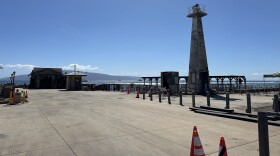-
Department of Land and Natural Resources Wildlife Biologist Afsheen Siddiqi spoke with HPR’s Maddie Bender about the third presumptive case of avian influenza in a bird in Hawaiʻi.
-
Land spanning from the Nuʻuanu Pali lookout to the H-3 freeway is now in the state’s hands for conservation and stewardship.
-
Officials are monitoring a trio of nēnē in Hilo’s Lili‘uokalani Gardens to ensure a successful nesting season for the nesting female.
-
Lahaina recovery marks a milestone as the town’s burned harbor reopens with limited use. HPR’s Catherine Cluett Pactol has more.
-
Members of the Puʻuhonua O Waiʻanae (POW) village are moving into new permanent homes located within Waiʻanae Valley. POW will be dismantled and returned to the state Department of Land and Natural Resources.
-
New cases of ROD are confirmed in a U.S. Department of Agriculture Agricultural Research Service lab in Hilo. For the duration of the shutdown, the lab is not processing new samples.
-
State Sen. Joy San Buenaventura spoke with The Conversation’s Catherine Cruz about the collapse of the dredging project at Pohoiki Bay on Hawaiʻi Island.
-
State Sen. Joy San Buenaventura of Hawaiʻi Island responds to the failure of the Pohoiki Boat Ramp dredging project; Louis Miller and Jon Holshue, aka The Pasta Boys, dish up homemade noodles at Proof Social Club in Chinatown
-
The sounds of invasive coquí frogs have been heard in Waimānalo since at least 2021. On a recent Thursday night, HPR's Savannah Harriman-Pote went out with a state-led team of volunteers trying to restore the soundscape of the Windward Oʻahu forest.
-
The 36-acre recreation spot in Kahuku closed in 2023 for infrastructure upgrades. Alan Carpenter, the assistant administrator for the Hawaiʻi State Parks Division, said the old campgrounds and cabins were outdated, rotting — and some parts were illegal.
Play Live Radio
Next Up:
0:00
0:00
Available On Air Stations










